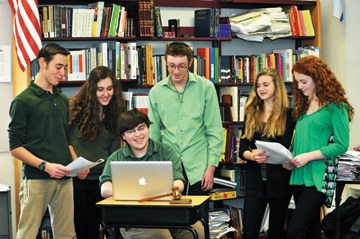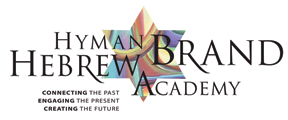 By Barbara Bayer, Editor
By Barbara Bayer, Editor
In the seven years Howard Haas has served as head of school at Hyman Brand Hebrew Academy, he has been calling the area’s only Jewish day school the jewel of the Midwest. He, along with the school’s students, teachers and parents, will get a chance to show how the school, and the Kansas City area, sparkles and shines when HBHA hosts, for the first time, the annual Moot Beit Din, sponsored by RAVSAK: The Jewish Community Day School Network. More than 80 students and their advisers will travel here for the competition that takes place March 27-30 at the Kansas City Airport Marriott.
Haas said HBHA has wanted to bring the Moot Beit Din here for several years. He’s happy the event is giving the school a chance to showcase itself and the city.
“We have a treasured Jewish community here, and I think it’s one of the best kept secrets around. We’re moving out of that mentality now because we have some programs at the school and in the city which are really unique and are getting national attention,” he said.
“My hope is that some of the young people who come here might put a thought in their head and heart that Kansas City might be a great place to spend time.”
Moot Beit Din challenges Jewish high school students to examine the ethical and moral dimensions of halachah through creative engagement with contemporary situations. Combining the best of debate with legal analysis, Moot Beit Din exposes students to the vitality of the Jewish legal system and its relevance to their own lives. Teams of students are given a contemporary dilemma and asked to write a judgment using Jewish texts. The teams then come together for a weekend Shabbaton where they meet their peers for four days of Jewish learning, community-building, prayer and fun, all within a pluralistic Jewish environment.
Lisa Inberg, RAVSAK’s student programs coordinator, said this is always an exciting week for the RAVSAK network.
“For Hyman Brand Hebrew Academy, there is value in bringing a wide network of students together for collaborative and fun learning,” Inberg said.
“The (out-of-town) students will be shown the highlights of Kansas City and be able to appreciate the uniqueness of Kansas City’s Jewish community. Furthermore, the program offers an opportunity for the various community shuls and organizations to come together to support the school and the Moot Beit Din program,” she continued.
Weekend events
The Moot Beit Din participants will travel to HBHA bright and early Friday morning, March 27, for a variety of activities, beginning with breakfast. While at HBHA, they will participate in the weekly all-school Taste of Shabbat, attend a learning session, “Women and Tefillin,” taught by HBHA’s Head of Jewish Studies Rabbi Avi Weinstein, and then have lunch.
“Breakfast and lunch here at HBHA is being made possible by a generous donation from Susie and Ron Goldsmith,” he added.
When they leave the school, Haas said, “They will visit the World War I Museum and the Nelson-Atkins Museum and then they will do some walking and shopping at the Plaza.” The students will return to the hotel prior to Shabbat for the remainder of the weekend.
Many members of the Kansas City Jewish community are helping to make this event run smoothly. At HBHA, Michal Cahlon, the middle and upper school Jewish studies chair, is the team’s adviser. Jewish studies teach Zohar Flacks is coordinating the event for the school along with a committee of parent volunteers. Caterer Kim Matsil will handle the preparation of the kosher food, which will be Vaad supervised, for the event. The food will be prepared off site and transported to the hotel.
“We couldn’t do this without all our wonderful volunteers,” Haas said.
“They are a tremendous help,” added Flacks. “They will be there during the entire event. We are very fortunate to have them.”
Cahlon, who has attended several competitions with HBHA students, noted that on Shabbat participants will participate in either a traditional or an egalitarian minyan. After lunch students will attend their choice of Torah-learning sessions.
“The students will also have time to hang out and get to know other young people from the school throughout the United States and Canada,” said Cahlon. “There are usually four to a room and they will room with students from other schools since the rooms are by gender.”
Following Havdalah, Cahlon said the students will disperse so they can do some last-minute preparations for their Sunday-morning oral presentations.
The Moot Din
 This year’s Moot Beit Din focuses on animal welfare, ethical farming and its economic impact through a halachic lens. Teams from 20 different school will compete in one of three divisions in the competition. The HBHA team consists of Ariel Brudoley (9), Lainie Kaseff (10), Jacob Katz (10), Lindsey Paul (10), Hannah Pinson (10), Ezra Smith (11) and Leah Sosland (9). Only four students — Jacob, Hannah, Lindsey and Ezra — can actually represent HBHA during the competition’s oral presentation. Cahlon said the non-presenting team members have been an integral part of the preparation process all the way through, “and the hope is that they will continue with Moot Beit Din and possibly be our presenting team in a future year.”
This year’s Moot Beit Din focuses on animal welfare, ethical farming and its economic impact through a halachic lens. Teams from 20 different school will compete in one of three divisions in the competition. The HBHA team consists of Ariel Brudoley (9), Lainie Kaseff (10), Jacob Katz (10), Lindsey Paul (10), Hannah Pinson (10), Ezra Smith (11) and Leah Sosland (9). Only four students — Jacob, Hannah, Lindsey and Ezra — can actually represent HBHA during the competition’s oral presentation. Cahlon said the non-presenting team members have been an integral part of the preparation process all the way through, “and the hope is that they will continue with Moot Beit Din and possibly be our presenting team in a future year.”
HBHA is participating in the sourcebook only division, where students are allowed to use just this one source. Two other divisions are offered, one where students can use the sourcebook as well as do additional research. Those participating in the third division do all the research and are not provided with a sourcebook.
“This is a really exciting way for students to see how the halachah can be used to explain and guide modern questions and problems,” Cahlon explained.
Each division is judged by a panel of three judges. The nine community leaders serving as judges are: Michael Abrams; Brauna Doidge; Rabbi David Glickman; Rabbi Mark H. Levin; Ayala Zoltan Rockoff, Ph.D.; Rabbi Daniel Rockoff; Rabbi Elchanan Schulgasser; Rabbi Berel Sosover; and Rabbi Scott White. Their bios can all be found on the RAVSAK website, www.ravsak.org.
“We have a set of really quality judges lined up,” Cahlon said.
The first stage of the competition calls for the students to create a 10-page legal brief, which is submitted anonymously to the judges ahead of the actual Moot Beit Din event. The judges score the brief, worth 50 percent of the final score, and return it to the teams.
The oral presentation takes place at the Moot Beit Din event. Each team gets approximately 20 minutes to present their case, 10 minutes for the brief itself with the rest of the time devoted to questions from the judges.
“It’s possible for a team to do a spectacular presentation, but if their initial brief wasn’t strong, they may not win. Or a team could have an excellent brief, but their oral presentation was not strong, yet they might still place based on the strength of that brief because that gave them a boost over other teams,” Cahlon explained.
“There is always an element of mystery when you are sitting there on the final day waiting for the judges to announce their decisions because you saw 50 percent of what generated the decision. The judges are the only ones who actually see the whole picture,” she continued.
Jacob, who competed last year with three other freshmen — Lindsey, Hannah and Jed Shaffer — really enjoys taking part in Moot Beit Din.
“Last year we came in second and that’s the best the school has ever done in the Moot Beit Din. We were an all freshmen team and we are very proud of ourselves,” Jacob said.
Lindsey said it’s cool to get to meet kids from the other Jewish schools.
“We don’t have many other opportunities to do that. It’s also fun to solve a case our own way,” Lindsey said.
Hannah said the competition helps them learn to use sources and interpret them in a way similar to an American law case.
“It’s interesting to see how they are connected,” Hannah said. “The work experience is really valuable. We learn to manage our time and work as a team and meet deadlines.”
Adviser Cahlon is excited for the event.
“For me, Moot Beit Din is a culmination and a celebration: a culmination of my students’ hard work in wrestling with the Jewish sources and applying them to the contemporary issues of the case, and a celebration of the joy of Torah study, multiplied when shared with their peers from across North America.”
The event is open to the public and HBHA organizers hope many members of the Kansas City Jewish community attend the competition, to be held from 9 a.m. to noon, to show their support. The competition is also being streamed live on the RAVSAK website Sunday morning.